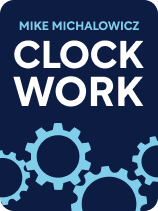

This article is an excerpt from the Shortform book guide to "Clockwork" by Mike Michalowicz. Shortform has the world's best summaries and analyses of books you should be reading.
Like this article? Sign up for a free trial here.
How common is entrepreneur burnout? Can you run your business without working yourself to burnout?
Burnout plagues many entrepreneurs. According to Mike Michalowicz, the main reason entrepreneurs suffer from burnout is that they try to run and oversee everything themselves instead of delegating daily operations to their employees.
Here’s why entrepreneurs suffer from burnout, according to Michalowicz.
Why Entrepreneurs Suffer From Burnout
Michalowicz argues that entrepreneurs get burned out because they run their businesses using a hands-on approach. Hands-on entrepreneurs involve themselves in most aspects of their company’s daily operations. This includes everyday tasks (such as corresponding with customers) and related decisions (such as when to proactively contact customers). Even entrepreneurs who delegate daily tasks to their employees are hands-on, since these entrepreneurs still make most of the decisions behind those tasks.
(Shortform note: Research reveals that entrepreneurs experience a unique form of burnout, partly due to the stress of making too many decisions. This finding supports Michalowicz’s claim that a hands-on approach (which entails making many decisions) contributes to entrepreneur burnout. Entrepreneur burnout tends to manifest in the body and persist beyond work hours. Burned-out entrepreneurs typically experience both physical exhaustion and difficulty thinking clearly. By contrast, employee burnout tends to show up during work hours. Burned-out employees feel unmotivated to do their best work and disconnected from colleagues.)
Why Entrepreneurs Burn Themselves Out With a Hands-On Approach
Michalowicz argues that entrepreneurs default to a hands-on approach because it feeds their self-esteem. When they handle daily operations and related decisions, they feel essential to their company’s success. Feeling essential boosts their self-esteem.
(Shortform note: In Traction, Gino Wickman claims that entrepreneurs entwine their self-esteem with their business (and maintain a hands-on approach) because they see their company as an extension of their identity. In order to grow their company beyond its early stages, entrepreneurs must abandon this notion and reduce their hands-on involvement.)
Although a hands-on approach boosts self-esteem, Michalowicz argues that this approach also burns entrepreneurs out by distracting them from improving their business framework. A business framework includes the company’s mission, employee roles, and routines for measuring and modifying daily operations. When entrepreneurs busy with hands-on work neglect to improve their company framework, small issues grow into crises.
When small issues grow into crises, an entrepreneur enters crisis mode: They work long hours to address crises on top of their usual hands-on duties. Crisis mode burns them out, leaving them ill-equipped to fully resolve these crises. Eventually, the burned-out entrepreneur loses their motivation for running their business.
To illustrate, consider this hypothetical small issue: There’s a slight decline in the number of customers who enter your company’s store. If you’re not absorbed in hands-on work, you could improve your business framework by researching and designing novel ways to attract new customers (such as promoting your business on social media). By contrast, if you’re immersed in hands-on work, you’d be too busy to make these improvements. Eventually, the small issue would swell into a crisis: a long-term or sharp decline in customers. You’d enter crisis mode as you scramble to resolve this larger issue, burning yourself out.
(Shortform note: While Michalowicz emphasizes how a hands-on approach harms entrepreneurs by burning them out, other experts illustrate how a hands-on approach also harms your employees and your relationships with them. Jocko Willink and Leif Babin, authors of The Dichotomy of Leadership, argue that when your employees notice your overinvolvement in daily operations, they become passive. Instead of innovating and developing independence, they wait for you to assign them tasks. Over time, their passive role demotivates them and limits their growth. In Ego is the Enemy, Ryan Holiday adds that a hands-on approach can breed resentment among your employees because they may find your overinvolvement domineering.)
Why Productivity Tricks Fail to Fix Burnout
Next, we’ll explore how entrepreneurs typically try to fix their burnout—and why it fails. Michalowicz argues that entrepreneurs misdiagnose burnout as a productivity problem, rather than a result of their hands-on approach. They mistakenly believe burnout is a productivity problem because an abundance of books and apps promise to help them organize their day, work more efficiently, and avoid distraction. These resources give entrepreneurs the impression that they’re burned out because they’re not productive enough.
(Shortform note: Despite Michalowicz’s claim that productivity apps don’t address the true problem of hands-on entrepreneurship, it’s likely productivity tricks will continue to entice entrepreneurs in the future: Experts predict that the global market for productivity apps will continue growing at an average annual rate of 9.1% over the next 10 years.)
Let’s explore two reasons why productivity tricks fail to alleviate entrepreneur burnout.
Reason 1: Productivity Tricks Don’t Reduce Your Work Hours
First, Michalowicz argues that productivity tricks fail to fix burnout because they train you to work more efficiently instead of working less. With both routine, hands-on tasks and crises to manage, hands-on entrepreneurs always have more work than they can squeeze into their days. Even if they learn to maximize their efficiency, they continue to fill their schedules with these additional tasks. Entrepreneurs don’t need support working more efficiently; they need support working less.
(Shortform note: Entrepreneurs aren’t the only people who tend to pack their schedules with work. In Four Thousand Weeks, Oliver Burkeman argues that all people living in industrialized societies engage in this habit because our society values productivity over free time. He looks to history to explain why: During the Industrial Revolution, business owners began treating workers’ free time as a means to an end. These business owners provided workers with free time only so they returned to work recharged and ready to be maximally efficient. This emphasis on free time as a strategy for increasing productivity, rather than as something to enjoy, still persists today.)
Reason 2: Productivity Tricks Don’t Prevent Crises
Second, Michalowicz claims that productivity tricks fail to fix burnout because they don’t prevent crises. As previously noted, crises emerge when entrepreneurs busy with hands-on work neglect to address fractures in their business framework. Productivity tricks may teach entrepreneurs to handle crises more efficiently, but they don’t teach you how to prioritize designing a framework that prevents crises from arising in the first place.
| Productivity Tricks That Can Help You to Prioritize Here, Michalowicz dismisses all productivity resources, claiming that their emphasis on efficiency fails to help entrepreneurs prioritize framework-building. However, some productivity resources do offer strategies for prioritization. These strategies could help an entrepreneur identify and prioritize framework-building efforts. For example, in his book Eat That Frog!, Brian Tracy argues that you can improve your productivity by identifying your most important task and completing it first. Your most important task is usually the hardest one, so you procrastinate on it by packing your time with easier, less important tasks. When entrepreneurs fill their schedules with hands-on work, they’re procrastinating on the more difficult, most important task of fixing their company’s framework. Tracy recommends countering this tendency to procrastinate on your most important task by making a list of your daily or weekly tasks and imagining the future consequences of avoiding each one. Your most important task is the one that would cause the largest crisis for your business if you avoided it. |

———End of Preview———
Like what you just read? Read the rest of the world's best book summary and analysis of Mike Michalowicz's "Clockwork" at Shortform.
Here's what you'll find in our full Clockwork summary:
- How you can take a four-week vacation as a small business owner
- How to avoid burnout as an entrepreneur
- Why a hands-on approach to leadership is usually not the best method






